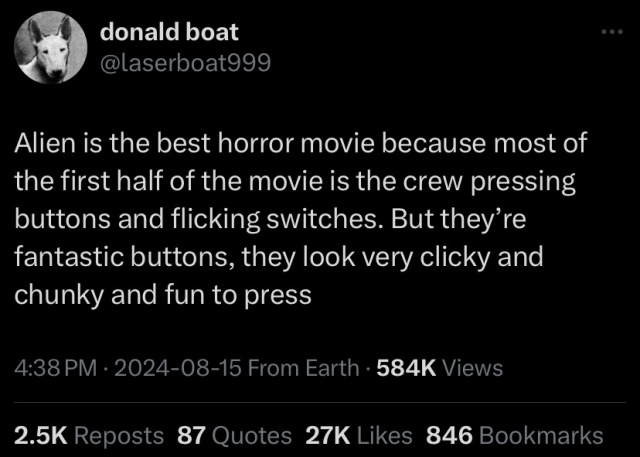“The Push of a Finger (free Gutenberg download) by Alfred Bester, was my second go at reading a story that I loved when I was 12 years old. I re-read it this past weekend, and very much enjoyed it. (Previously: Revisiting a childhood favorite story: ‘Dreams are Sacred’ still delights.)
As with “Dreams Are Sacred,” the Bester story is still entertaining. Like “Dreams Are Sacred,” the hero is a street-smart, wisecracking New York newspaperman with a brain in his head and abundant common sense. Published in 1942 in Astounding Science Fiction, “The Push of a Finger” is set a thousand years in the future, but the situations and language are straight out of a screwball comedy or noir movie from the 40s.
The hero is Carmichael, one of a dozen reporters for as many different newspapers assigned to the mysterious Prog Building in New York, where the technocrats who run the world issue pronouncements to preserve the Stability that has been the rule of civilization for centuries. The reporters are a brawling, fast-talking bunch, but they keep to their roles. By the rule of the Stability, every newspaper must have a balancing newspaper on the other side, and every decision by the ruling technocrats must be met by full-throated agreement by one newspaper and equal denunciation by its opposite number.
Carmichael finds a way to sneak into the mysterious Prog Building and discovers an event that will destroy the universe in a thousand years. “The Push of a Finger” has a similar gimmick to the far more famous “The Sound of Thunder," by Ray Bradbury, which ran in the far more upscale Collier’s magazine in 1952: The cataclysmic change in the future can be prevented by a trivial change in the present. Carmichael leads a team of technocrats in finding out what that minor, precipitating event is and stopping it.
I’m making the story sound more bombastic than it is. Bester was always a playful writer, fond of wordplay, absurdism and doggerel. In “The Push of a Finger,” a crowd of students at a demonstration chants
Neon
Krypton
Ammoniated
FitzJohn
and that bit of verse has been stuck in my head for days. (And now it’s stuck in yours. Um sorry I guess.)
Later, one of the characters exclaims, “I’ll be a pie-eyed emu!” which proves to be important.
Bester seemed to be drinking from the same creative well as the Beats (Kerouac, Ginsberg, etc.), but a decade or two earlier, and pinning his writing to a scaffolding of pulp science fiction.
Bester’s best-known novels were “The Demolished Man” (1953), a murder mystery in a society of telepaths, and “The Stars My Destination” (1956), a retelling of the Count of Monte Cristo in a society where people have the power to teleport from one location to another by sheer force of mind.
The politics of “The Push of a Finger” are typical of science fiction of the day and maybe of the U.S. at that time. The world of the future was going to be highly organized, centrally planned, and run by technocrats, just as the real world was at that time. It was 1942 – World War II was raging, the Depression was just a few years earlier, and the great nations of the world were highly centralized machines governed by technocrats. Surely that would continue forever. That’s the way Isaac Asimov wrote, and even Robert A. Heinlein, later an icon of libertarianism, featured centrally planned societies in his early stories, published at about this time.
I didn’t talk abut racism and sexism in “Dreams are Sacred” and I don’t have much to say about it here. Both stories are typical in that regard for pulp science fiction written and published in the 1940s. Race isn’t mentioned, women are nearly in the background, LGBTQ and disabled people don’t exist.
Something odd along those lines that I did notice: In the American pulps of the 40s and earlier, characters almost always had Anglo or European names: Carmichael, Pete Parnell, Steve Blakiston, etc. This was the norm back then, and I grew up in the 70s immersed in stories from that period and didn’t think twice about it. But re-reading those stories today, the high percentage of Anglo names (and the missing women and nonwhite people and disabled and LGBTQ people) stands out to me as weird. I’m not saying this to condemn the writers of that era; they were living in their world just as I live in ours. But it’s odd and unrealistic.
Bester was a giant of science fiction when I was a young fan in the 70s, and all science fiction fans then would have heard of him and most would have read him. Now I suspect he’s nearly forgotten by anybody under 50. Sic transit gloria mundi.




























